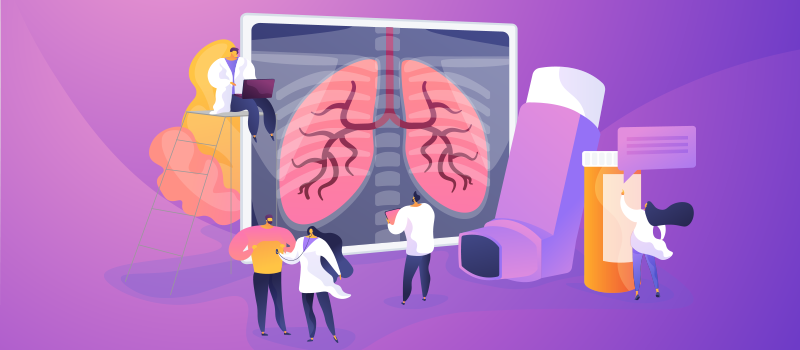What’s the Buzz
The Bee Healthy Blog
Chronic Conditions Resulting from EBV

The Epstein-Barr Virus (EBV) is a type of herpes virus and is one of the most common viral infections in humans. Other viruses from the same family of EBV include shingles and chickenpox viruses. It is estimated that over 95% of adults carry the Epstein-Barr virus, and the majority of children are infected as well.
EBV infection is frequently asymptomatic (it does not cause any symptoms). Sometimes, EBV causes a mild illness called infectious mononucleosis (IM or mono), most commonly in teens and young adults. Once infected with the Epstein-Barr virus, it remains dormant in the body without causing any further problems. However, in some people, it can develop into a chronic active EBV infection with long-term and potentially life-threatening health consequences.
Please continue reading to learn more about the Epstein-Barr virus, including the symptoms, transmission, prevention, and treatment, as well as the long-term effects of chronic active Epstein-Barr virus.
What is Epstein-Barr Virus (EBV)?
Epstein-Barr virus (EBV) is also called the human herpes simplex virus type 4. It occurs worldwide and is a very common virus that infects humans. Most people get infected with the Epstein-Barr virus at some point in their lives.
EBV infections in children don’t usually cause any symptoms, or they cause a non-specific illness that resembles other mild, brief childhood illnesses.
In adolescents and young adults, Epstein-Barr virus infection can cause an illness called acute infectious mononucleosis (mono). The signs and symptoms of infectious mononucleosis include fever, fatigue, sore throat, rash, swollen lymph nodes in the neck, enlarged spleen, and enlarged liver. Mononucleosis symptoms usually resolve in 2-4 weeks, but they can last longer in rare cases.
In most people, once a person is infected by the Epstein-Barr virus, the virus becomes latent or inactive in the body. However, the virus can be reactivated in some people, leading to a chronic illness called chronic active EBV infection (CAEBV). This chronic Epstein Barr virus disease does not cause problems for most people. But in people with weakened immune systems, it can lead to symptoms and health complications.
How does EBV infection spread?
EBV spreads primarily through bodily fluids, mainly saliva but also blood and semen. You can catch EBV infection through kissing, sharing a toothbrush, or drinking from a glass recently used by an infected person. EBV infected cells can also be transmitted through sexual contact and blood transfusions.
What is the treatment for Epstein-Barr virus?
There is currently no vaccine to protect against EBV infection. Also, there is no specific medication that can kill virus-infected cells. The treatment for acute EBV infection (infectious mononucleosis) consists of staying well hydrated, getting plenty of rest, and taking over-the-counter medications for fever and pain.
You can reduce your risk of getting EBV infection by avoiding kissing and sharing food and personal items like toothbrushes with infected individuals.
Can Epstein-Barr cause long-term effects?
A small number of people are not able to control the EBV infection. In these individuals, the Epstein-Barr virus reactivates and infiltrates the cells of the immune system. Such people demonstrate EBV positive T, NK, or B cells (these are different types of immune system cells). Significant amounts of EBV are also detected in the blood of such people.
In people with a reactivated virus, the illness caused by EBV does not resolve. Some people develop a severe form of infectious mononucleosis that can lead to death within days or weeks of becoming infected. Some people develop progressive immunodeficiency (weakened immunity). In yet others, the primary infection has a more chronic (long-lasting) course and develops into a severe chronic active infection called CAEBV (chronic active EBV).
People with chronic active Epstein-Barr virus can have persistent or intermittent symptoms of infectious mononucleosis. They can have a recurrent fever, enlarged lymph nodes, enlarged spleen, and EBV hepatitis (liver inflammation).
What diseases can you get from Epstein-Barr?
EBV has been linked to the activation of various genes. EBV gene expression can increase a person’s risk of developing a number of diseases. Here’s what happens: The Epstein-Barr virus inserts itself into specialized immune cells called B cells. It hijacks the cells’ DNA and takes control of the B-cells, reprogramming them and changing the way they function. This is called CAEBV B cell disease. Some people develop T cell disease or NK cell disease (these are different types of immune cells).
If the Epstein Barr virus gene expression in immune cells is not deactivated, the virus can continue to modify the host cells’ DNA. This leads to a disruption of critical processes such as apoptosis (programmed cell death). Uncontrolled growth of the cells can lead to EBV-associated malignancies (cancer).
In healthy individuals, immune cells recognize and destroy EBV-infected cells. However, in people with impaired immunity, the virus can continue to multiply uncontrollably and lead to various diseases.
Some of the diseases that EBV can cause include:
- Infectious mononucleosis
- Chronic fatigue syndrome
- EBV associated cancers like Hodgkin lymphoma, non-Hodgkin lymphoma, Burkitt lymphoma, nasopharyngeal carcinoma, prostate cancer, breast cancer, gastric adenocarcinoma, colon cancer, and others
What autoimmune diseases are linked to EBV?
The Epstein-Barr virus (EBV) can interact with genes and increase the risk of developing autoimmune diseases. EBV is strongly linked to autoimmune disorders such as:
- Multiple sclerosis (MS)
- Systemic lupus erythematosus (SLE or lupus)
- Autoimmune thyroid disorders like Hashimoto’s thyroiditis
- Rheumatoid arthritis
- Juvenile idiopathic arthritis
- Graves’ disease
- Meniere’s disease
- Type 1 diabetes
- Inflammatory bowel disease (IBD)
- Celiac disease
- Lyme disease
The Takeaway
Epstein-Barr viral infection is very common. The virus spreads through contact with infected bodily fluids. Most people get infected with EBV during childhood and don’t experience any symptoms. In teenagers and adults, EBV infection can cause an illness called infectious mononucleosis or mono with symptoms like fatigue, fever, and swollen lymph nodes.
EBV can rarely cause chronic active EBV infection or a severe acute illness that can be fatal without treatment. EBV is also linked to severe health conditions, including cancers and chronic autoimmune diseases. More medical research is needed, and scientists are still studying the exact role of the Epstein-Barr virus in a range of medical conditions.
References:











SOCIAL